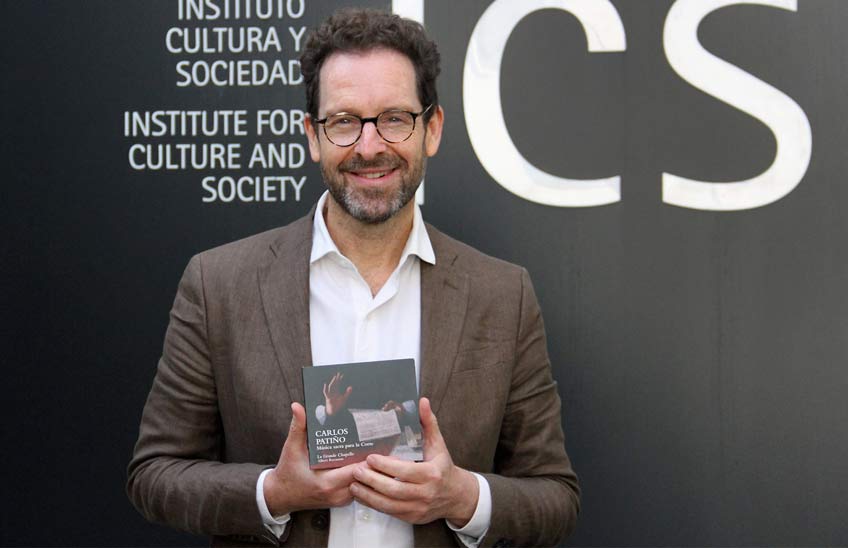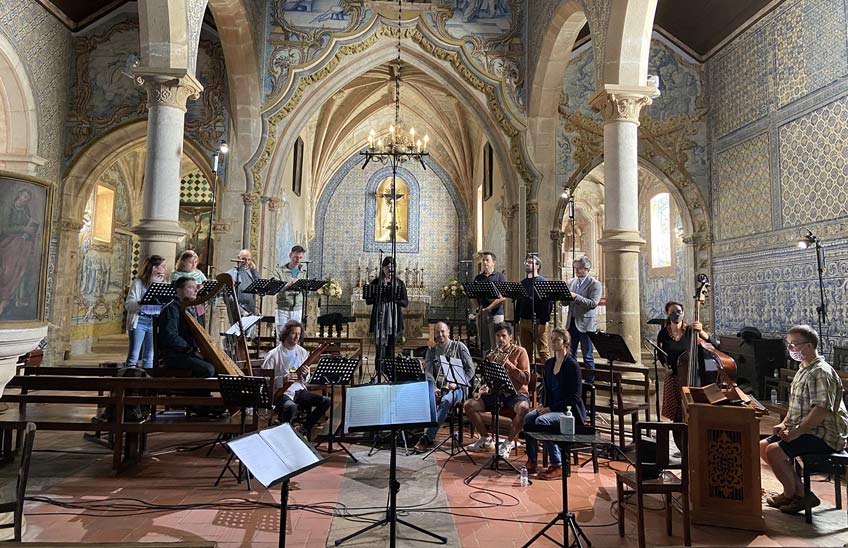Carlos Patiño, el músico al que Felipe IV no quería jubilar: se edita la primera grabación de sus obras emblemáticas cuatro siglos después
Albert Recasens, investigador de la Universidad y director del conjunto La Grande Chapelle, presenta la recuperación musicológica de las obras vocales en latín más destacadas de este genio hispánico del Barroco

FotoNatalia Rouzaut/<br>Albert Recasens es investigador del grupo 'Creatividad y herencia cultural' del Instituto Cultura y Sociedad (ICS) y director del conjunto musical La Grande Chapelle.
26 | 05 | 2021
Carlos Patiño (1600-1675) fue maestro de capilla de Felipe IV durante 30 años y el monarca apreciaba tanto su música que nunca le permitió jubilarse. Cuatro siglos después se presenta la primera grabación mundial con las obras vocales en latín más emblemáticas de este genio barroco. La recuperación ha corrido a cargo del director y musicólogo Albert Recasens, que ha investigado las obras en el Instituto Cultura y Sociedad (ICS) de la Universidad de Navarra y las ha grabado al frente de su conjunto La Grande Chapelle.
Para realizar esta labor ha consultado los fondos de numerosos archivos en los que se conserva el legado del maestro conquense, como los de los monasterios de Montserrat y El Escorial, que custodia la principal colección de obras suyas en latín; los de las catedrales de Ávila, Burgos, Cuenca, Valencia, Las Palmas, Valladolid, Segovia, Salamanca y Santiago de Compostela; y la Biblioteca Nacional de Catalunya, entre otros. También ha accedido a documentos preservados en el Nuevo Continente: Ciudad de Guatemala y Puebla.
Patiño se formó en la catedral de Sevilla, donde entró en contacto con el duque de Braganza y el futuro rey Juan IV de Portugal, con el que mantuvo correspondencia. Tras el fallecimiento de su esposa, quiso alejarse de la capital andaluza y se dirigió a Salamanca. Posteriormente partió a Madrid y consiguió la plaza de maestro de capilla del Real Monasterio de la Encarnación. Durante esos años consolidó su prestigio en la corte y en 1634 se convirtió en maestro de capilla de Felipe IV. Fue el primer no francoflamenco que logró ese puesto en la corte de los Habsburgo españoles.
“Durante esas tres décadas al servicio del rey se convirtió en referente para las catedrales españolas y latinoamericanas”, ha asegurado Recasens, quien considera que “se trata de uno de los grandes maestros del Barroco y un innovador en su país natal, ya que integró elementos de la modernidad europea”. Su influencia -ha detallado- resultó determinante para las siguientes generaciones de músicos hispánicos.
Reconstruir el paisaje sonoro en tiempos de Velázquez
Del extenso corpus vocal de Patiño, Recasens ha seleccionado para el disco algunas de sus composiciones religiosas en latín más emblemáticas, escritas para las grandes ceremonias de la corte. Entre las joyas recuperadas se encuentra una versión inédita conservada en Segovia del motete Maria Mater Dei, una de las composiciones predilectas de Patiño. “Lo sabemos porque se hizo retratar con ella en el cuadro que se conserva de él en la Biblioteca Nacional. Es la única obra pictórica que nos ha llegado de un músico español del siglo XVII”, ha apostillado Recasens.
El experto ha subrayado que la investigación y el disco “contribuyen a reconstruir el paisaje sonoro en tiempos de los genios del siglo XVII, como Velázquez o Calderón de la Barca”. Uno de sus objetivos es, precisamente, “colmar lagunas” sobre los grandes compositores de la época: “El Siglo de Oro hispánico es reconocido internacionalmente por su literatura, artes plásticas, escultura, arquitectura… También debemos recuperar el repertorio musical, que forma parte del patrimonio de toda Europa y de la humanidad”.
Carlos Patiño: Música sacra para la corte se enmarca en la colección discográfica de música antigua del CSIC “Musica Poetica”. Se ha editado con el patrocinio del Consejo Superior de Investigaciones Científicas (CSIC) y de la Consejería de Cultura y Turismo de la Comunidad de Madrid. Cabe destacar que se grabó en septiembre de 2020 en la iglesia de san Quintín en Sobral de Monte Agraço, en Portugal, con numerosas dificultades logísticas derivadas de la pandemia.
El trabajo de recuperación y el álbum se presentarán el día 1 de junio en un evento virtual que contará con la participación de Albert Recasens; Pablo L. Rodríguez, profesor de Universidad de La Rioja y crítico de El País; Guillaume Kientz, Director de la Hispanic Society (Nueva York, EE. UU.); Antonio Álvarez-Ossorio Alvariño, profesor de la Universidad Autónoma de Madrid (UAM) y director del Madrid Institute for Advanced Study (MIAS); y Julia Pavón, investigadora principal del grupo ‘Creatividad y herencia cultural’ del ICS.

El disco se grabó se grabó en septiembre de 2020 en la Iglesia de san Quintín en Sobral de Monte Agraço, en Portugal, con numerosas dificultades logísticas derivadas de la pandemia.
Jornada virtual de presentación del álbum Carlos Patiño: música sacra para la corte
Día: martes, 1 de junio de 2021
Hora: 18:00
La actividad es abierta y gratuita.
